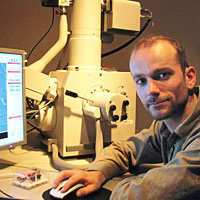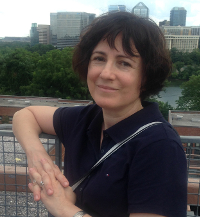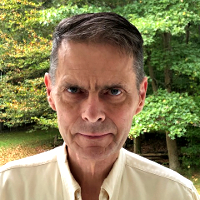 |
Ilya TëmkinAssociate Professor of Biology, Northern Virginia Community College (NOVA) and Research Associate, National Museum of Natural History (Smithsonian Institution) |
Ilya Tëmkin is an interdisciplinary scientist who studies how evolution works in nature and in human culture in the general framework of the hierarchy theory. An expert on bivalve mollusks, he analyzes the relative roles that ecology, history, and individual development play in diversification and the evolution of organic form. As a specialist on the history of musical instruments (and a passionate musician), Ilya explores the question to what extent the mechanisms of information transmission and historical change in human culture mirror evolutionary changes in living systems using musical instrument design as a model system. He was a postdoctoral researcher at the American Museum of Natural History (New York) and the National Museum of Natural History (Smithsonian Institution, Washington D.C.), and a visiting curator at Muséum National d’Histoire Naturelle (Paris). He published on evolutionary theory, molluscan biology, and human cultural evolution. Most recently, he co-edited Evolutionary Theory: A Hierarchical Perspective (Chicago University Press, 2016).
NOVA Science Seminar Presentation: Evolution and the Structure of the Organic World (2012)
 |
Masoumeh (Simin) AssadiProfessor and Lab Manager, Biology, Northern Virginia Community College (NOVA) |
XXX.
 |
Karen Bushaw-NewtonProfessor of Biology, Northern Virginia Community College (NOVA) |
Karen Bushaw-Newton’s research on microbial ecology, and the structure and function of bacterial communities has taken her from the Beaver Ponds in northern Canada, to the coastal and inlands waters of Georgia and the mid-Atlantic including the Patuxent and Anacostia Rivers. She was a Knauss Sea Grant Policy Fellow and did her postdoctoral work at the Academy of Natural Sciences in Philadelphia. Most recently she worked as a researcher at the U.S. Geological Survey studying pathogens of amphibians. She has taught undergraduate and graduate microbiology courses for over ten years. Her research has been published in several journals including Nature, BioScience, the Journal of the Northern American Benthological Society, and the Journal of Environmental Pollution Research.
NOVA Science Seminar Presentation: Microbial Vignettes: It’s Okay to Be Small (2012)
 |
Mihaela ChamberlinAssociate Professor of Chemistry, Northern Virginia Community College (NOVA) |
Since 2010, Mihaela Chamberlin has been teaching a variety of chemistry courses at NOVA, both in-person and online (through the Extended Learning Institute). Her teaching interests include exploring new methods of active and experiential learning. Mihaela also heads the NOYCE program at the college, and she is in charge of managing the STEM learning assistants who currently work under this program. Prior to joining NOVA, Mihaela was a postdoctoral fellow at Johns Hopkins University School of Medicine and worked in biomedical research for several years in the Philadelphia area.
NOVA Science Seminar Presentation: Your Telomeres and Your Immortality (2014)
 |
Daniel H. FranssellProfessor of Computer Science, Northern Virginia Community College (NOVA) |
In 1974 Daniel Franssell enlisted in the Army as a violinist in the United States Army Band stationed here in Washington. He grew up in Minnesota and has an undergraduate degree in Music Education from the University of Minnesota. Before joining the United States Army Band, Daniel taught junior and senior high school orchestra for two years in Minnesota. He spent almost 27 years in the Army. During his army career, Daniel got a Master’s degree in Computer Science from The George Washington University. Twenty-five years ago, while in the United States Army Band, he started teaching Computer Science part time at NOVA. After retiring from the Band in 2001, Daniel started teaching full time at NOVA, where he takes pleasure in teaching Computer Science to the great diversity of NOVA students.
 |
Peter JoAssociate Professor of Biology, Northern Virginia Community College (NOVA) |
Dr. Peter Jo has been teaching Human Anatomy and Physiology (and the occasional nutrition course) for twelve years. He was a practicing chiropractor with an interest in conservative management of chronic neuromusculoskeletal disorders. He completed a clinical residency in rehabilitation at the Southern California University of Health Sciences (2002-2005) and combined principles of rehabilitation, strength and conditioning (CSCS, 2009), yoga (RYT-200, 2010), and nutrition to optimize patient outcomes. Peter’s research interests are mechanisms of neural recovery in spinal cord injury and stroke, and for his doctoral dissertation he analyzed intermuscular coherence and intralimb coordination in people with chronic stroke.
